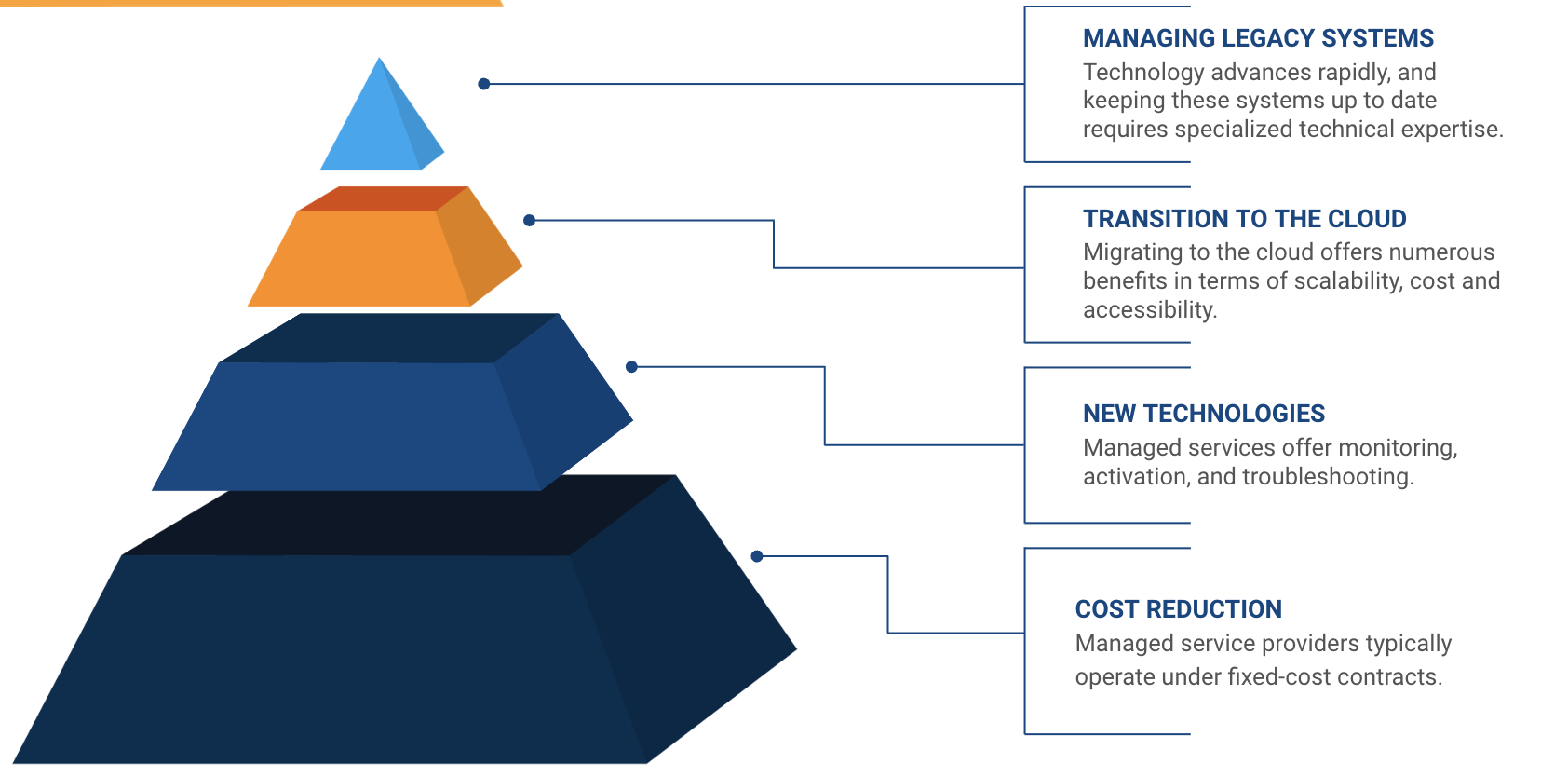
Managed services can be a strategic solution for companies looking to maximize efficiency and reduce costs in technology areas. From network and data center management to information security, these services allow companies to delegate specialized tasks to trusted providers, freeing up resources and supporting growth.
But how do you know if it's the right time for your company to implement managed services?
Evaluate these aspects to see if your company needs managed services
Does your company need to manage legacy systems efficiently?
Many companies still rely on legacy systems that, while they serve their purpose, can become complex to maintain as time goes on. Technology advances rapidly, and keeping these systems up to date requires specialized technical expertise. Managed service providers can:
- Maintain and update systems without interruptions in operation.
- Apply security patches and performance improvements in real time.
- Ensure that systems are aligned with current regulations and security requirements.
Having a specialized service to manage these systems allows companies to focus on innovating in other areas without compromising the stability of their fundamental systems.
Assisting with cloud transition with Managed Services
Cloud migration offers numerous benefits in terms of scalability, cost reduction, and accessibility. However, the move involves a number of technical and strategic challenges, especially if the organization has a complex infrastructure. Managed service providers can guide businesses through cloud migration by:
- Providing detailed planning and migration strategies.
- Ensuring that data is transferred securely and efficiently.
- Implementing a cloud architecture that supports growth and operational efficiency.
For many businesses, having an expert manage the transition reduces the risks of a poorly executed migration, which could result in data loss or downtime.

Navigating the world of modern technology: Is your infrastructure too complex?
The rapid growth of technology has introduced a number of innovative tools and systems that can benefit businesses. However, managing these tools can be complicated and resource-intensive. Companies that rely on a complex technology infrastructure often need:
- Constant monitoring of networks, access devices, and data centers.
- Integrated solutions for video conferencing, online collaboration, and remote access.
- Security management to protect data integrity.
Managed services offer monitoring, activation, and troubleshooting for all of these infrastructure elements, ensuring that devices are optimized and ready for daily employee use.
Cost reduction: Are your company's resources committed?
For small to medium-sized businesses, the costs associated with hiring and maintaining an in-house team of IT specialists can be a financial challenge. Setting up an IT department can include:
- Expenses on salaries, benefits, and ongoing training.
- Costs for office space and other administrative resources.
- Increased operating expenses in managing all the necessary tools and technologies.
Outsourcing through managed services allows businesses to reduce these expenses considerably. Additionally, managed service providers typically operate under fixed-cost contracts, making it easier for businesses to predict and manage their IT budget.

Does your business want to stay agile? Try managed services
As businesses grow, they often face additional challenges, both logistical and strategic, that require a rapid response. Managed services can help businesses:
- Scale up or down their IT resources based on business needs.
- Avoid the administrative hassles of hiring and managing additional staff.
- Access specialized technical support without compromising their focus on business objectives.
This model allows businesses to stay agile during times of growth, streamlining their organizational structure without complications.
Support for Growth: Is your company in the expansion stage?
Companies that are in a growth phase need additional support to establish the necessary infrastructure to support this advancement. Managed services allow these companies to access a solid and reliable infrastructure that not only covers current needs, but is prepared to scale with the growth of the company.
- Some areas where managed services can be beneficial include:
- Human resources services and support to manage growing teams.
- IT infrastructure and network services that maintain the connectivity and security of operations.
- Ongoing support for new technological implementations.

When does an in-house approach become inefficient?
Finally, it is important for companies to consider whether continuing to have an in-house IT team is sustainable. In-house management can lead to issues such as:
- The need to continually train the team to keep up with the latest technologies.
- The risk of losing key employees who possess critical system knowledge.
- The added burden on IT leaders, who must focus on oversight and management issues.
Managed services allow companies to delegate these responsibilities to highly skilled teams experienced in current technologies, freeing up internal IT leaders to focus on strategic decisions.
Knowing when to employ managed services is key to making the most of technological resources and internal talent. From managing complex systems to reducing costs and streamlining operations, managed services can be an optimal solution for companies of all sizes.
By evaluating these situations, companies can determine when is the right time to transition to a managed services model, thereby optimizing their infrastructure, reducing costs and ensuring their growth in a competitive digital environment.


